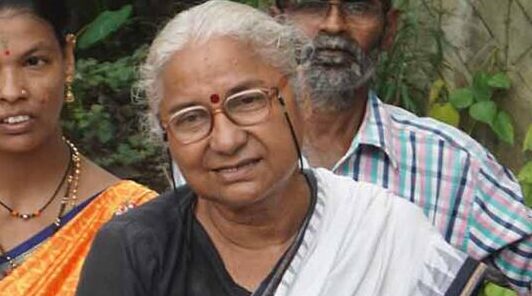Delhi Court Suspends Medha Patkar’s Sentence, Grants Bail in Defamation Case Involving LG VK Saxena
A recent decision by a Delhi court has sparked significant interest in the legal and activist communities. The court suspended a five-month sentence handed down to prominent social activist Medha Patkar, granting her bail in a criminal defamation case brought against her by Delhi’s Lieutenant Governor (LG), VK Saxena. This case, rooted in allegations from over two decades ago, has been a focal point in the ongoing legal debate surrounding defamation, free speech, and accountability.
Background of the Case
The origins of this legal battle date back to November 25, 2000, when Medha Patkar, a well-known advocate for social and environmental justice, issued a press release alleging that VK Saxena, who was then serving as the president of the National Council for Civil Liberties (NCCL), gave a cheque to her organization, the Narmada Bachao Andolan (NBA), which subsequently bounced. At that time, the NCCL was actively supporting the completion of the Sardar Sarovar Dam project, which Patkar’s NBA strongly opposed due to concerns about its impact on displaced communities and the environment.
Also Read: Trucking Injuries Attorney Houston: Seeking Justice After an Accident
Saxena viewed Patkar’s statements as an attack on his reputation, accusing her of making baseless allegations intended to harm his credibility. In response, he filed a defamation suit against her on January 18, 2001, claiming that the accusations were false and designed to damage his standing in both professional and personal circles. Over the years, the case has seen numerous legal twists and turns, reflecting the complexities involved in adjudicating defamation disputes.
Trial Court’s Verdict
On May 24, the trial court delivered its judgment, finding Medha Patkar guilty of criminal defamation. The court ruled that Patkar’s actions were deliberate, intended to malign Saxena’s character, and without any substantial evidence to back her claims. In its decision, the court emphasized that Patkar’s press release was not just a critique but an attempt to deliberately damage Saxena’s public image and standing.
The trial court sentenced Patkar to five months of simple imprisonment and imposed a hefty fine of ₹10 lakh as compensation to Saxena. The court noted that her age and medical conditions were considered when determining the length of her sentence. Judicial Magistrate Raghav Sharma highlighted that while a longer term would have been too harsh, a shorter sentence would not serve the purpose of justice given the severity of the accusations made against Saxena.
In his sentencing order, Sharma stated, “A sentence of five months simple imprisonment is appropriate, ensuring that the punishment is significant yet not excessively severe given her circumstances.” The decision balanced the need to punish Patkar while also acknowledging her advanced age and health issues.
Denial of Probation and Fine Imposed
Patkar’s plea to be released on probation was rejected by the court, which stressed that allowing probation in this case would undermine the efforts Saxena had put into this prolonged legal battle. The court reasoned that probation would be inconsistent with the principles of justice, especially considering that Saxena had been pursuing this case for over 25 years. According to the court, granting probation would effectively deny Saxena the justice he sought for the damage done to his reputation.
In addition to the prison sentence, the court also imposed a fine of ₹10 lakh on Patkar. This amount was intended as a compensatory measure for Saxena, reflecting the court’s acknowledgment of the emotional and reputational toll that the defamatory statements had taken on him. The court pointed out that the fine was not only punitive but also served as a restitution for the complainant.
Appeal and Suspension of the Sentence
Following the trial court’s verdict, Medha Patkar’s legal team quickly filed an appeal, challenging both the conviction and the sentence. They argued that the judgment against her was flawed and that the evidence presented during the trial was insufficient to establish defamation. Her legal counsel emphasized that the allegations made in the press release were within the realm of free speech and did not warrant criminal charges.
The appeal was heard by Additional Sessions Judge (ASJ) Vishal Singh, who reviewed the case and decided to suspend Patkar’s five-month sentence. Judge Singh granted her bail on a bond of ₹25,000, with a surety of a similar amount, pending the final decision on the appeal. This temporary relief allows Patkar to remain out of custody while the appellate court considers the arguments presented by both sides.
The Role of Free Speech and Defamation in Public Discourse
This case is not merely a dispute between two individuals; it highlights broader issues concerning the boundaries of free speech and the legal implications of defamation in public life. Medha Patkar, as a high-profile social activist, has often been involved in contentious issues that challenge governmental and corporate policies, especially those related to environmental and social justice. Her activism, including her leadership role in the Narmada Bachao Andolan, has led her to face both accolades and legal battles throughout her career.
Also Read: Auto Accident Attorney in Jacksonville, FL: Your Legal Lifeline
For Saxena, the defamation case represents a stand against what he perceives as an unjust attack on his reputation. His defense stresses that protecting one’s dignity and credibility from unfounded allegations is a legitimate endeavor, especially when the accusations are intended to undermine one’s professional and public image.
Next Steps and Legal Implications
The case is far from over, as the appellate court will now examine the evidence, the intent behind Patkar’s statements, and whether they crossed the threshold from legitimate critique to criminal defamation. The court’s decision will not only determine Patkar’s legal fate but could also set a significant precedent for future defamation cases involving public figures.
The court has asked for a response from the LG before the next hearing, scheduled for September 4. The upcoming legal proceedings will be closely watched, as they hold implications for the delicate balance between upholding an individual’s right to free speech and the need to protect personal and professional reputations from baseless accusations.
Conclusion
The suspension of Medha Patkar’s sentence and her release on bail mark a temporary reprieve in a long-standing legal saga. However, the core issues at stake—freedom of expression, the right to criticize public officials, and the legal limits of defamation—remain unresolved. As the appeal process unfolds, the judicial system will continue to grapple with these complex questions, and the final outcome will undoubtedly influence the discourse on civil liberties and accountability in India’s legal framework.


